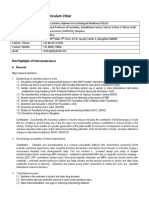The Code of Conduct For Psychologists
The Code of Conduct For Psychologists
Uploaded by
Ankit HasijaCopyright:
Available Formats
The Code of Conduct For Psychologists
The Code of Conduct For Psychologists
Uploaded by
Ankit HasijaOriginal Description:
Original Title
Copyright
Available Formats
Share this document
Did you find this document useful?
Is this content inappropriate?
Copyright:
Available Formats
The Code of Conduct For Psychologists
The Code of Conduct For Psychologists
Uploaded by
Ankit HasijaCopyright:
Available Formats
ethics as "the moral principles that govern a person's behaviour or how an activity is conducted".
In the context of clinical psychology, it would imply understanding the moral principles underlying
psychological thought and activity. Psychology as a science has always been related to, and embedded
in, the political and social attitudes of its time
The code of conduct for psychologists
Human understanding of the source of mental illness has evolved over the centuries. It probably began
with primitive notions of demonic possession or divine punishment, exemplified by ideas of witchcraft and
exorcism in medieval times. However, the idea of a "psyche" and a psychological treatment is also quite
old, with Greek philosophers emphasising the importance of looking within to understand mental
disturbance and talking through to deal with it. Scientific scrutiny and emphasis on individual differences
during the Renaissance, along placing mental illnesses in the realm of medicine rather than of religion
and philosophy, did much to demystify mental disorders at that time (3). The most important change,
however, took another three centuries and the humanistic stance of Pinel, Luke and Dix. They put the
spotlight on the treatment of the mentally ill and asked for more ethical and humanitarian treatment (6).
For the first time, professionals seriously considered what they owed their mentally ill clients.
Psychologists' striving for ethical behaviour led to the development of a code of conduct that governs and
ensures the rights of client and clinician. The profession gained acceptance as a service provider during
World War II when the need was felt for a code of ethics that established clinical psychology as a
profession capable of meeting its responsibilities to the public. The atrocities committed by Nazi doctors
brought the whole question of medical ethics to the forefront (8). In the US, an ethics committee was
formed in 1947 and its recommended code of ethics was circulated as early as 1953. More than 2,000
psychologists contributed substantially to those first guiding principles by sending in case vignettes of
ethical dilemmas that they had faced.
The crafters of that first code set the stage for a code of ethics for psychologists to be a continual work in
progress (9). The civil rights movement of the 1960s and 1970s kept the code relevant but it was not till
1992 that the code was reworked as enforceable rules of conduct rather than aspirations or values (8). If
one looks at the broad ethical principles developed by the American Psychologists Association (APA) in
the 1950s and compares it to the 2002 APA Ethical Code, the ideas remain the same (10).
Considerations of the good of humanity and society, benefiting clients and not doing them harm, providing
a competent service, the importance of the individual, equal and fair treatment, mutual respect, promoting
justice, respecting the rights and dignity of other human beings, as well as personal happiness and
fulfilment are the important principles.
The Indian Association of Clinical Psychologists has also adopted a code of conduct (11). This is based
on the APA code and, though shorter, covers similar areas. This includes:
a. Professional competence and services: The interest of the client is paramount and clinical psychologists
should keep abreast of recent developments in the field.
b. Referrals: If proper assessment is not possible this should be communicated to the referral source. If
referral to a physician, psychiatrist or other health professional is necessary, this referral should be made.
c. Opinion: Clinical psychologists should take full responsibility for their opinions under all circumstances.
d. Consent: It includes all information about the nature of illness, method of treatment, factors associated
with efficacy and risk factors.
e. Client welfare: This is paramount. Therefore clinical psychologists should not take up any case which is
f. not within their competence.
g. Court testimony: This should be based purely on findings and observations and should not include bias
and prejudice.
h. Confidentiality: Information should not be disclosed except to a concerned co-professional or an
appropriate authority. Test material should not be taken out of the clinic or laboratory except for teaching
purposes.
Education and training in clinical psychology
The following are important highlights from the APA 2002 code (10):
Clinical psychologists responsible for education and training programmes seek to ensure that there is a
current and accurate description of the programme content, training goals, objectives and requirements
that must be met for satisfactory completion of the programme and for certification.
Appropriate guidelines for evaluation are created and made explicit. Students are evaluated on the basis
of their actual performance.
Teachers and supervisors recognise the power that they have over students or those they supervise and
make reasonable efforts to avoid engaging in conduct that is personally harmful to students or those they
supervise.
Specific methods, such as hypnosis and the use of projective tests, are to be taught only to those who
have the prerequisite training, legal scope of practice or expertise.
Research and discussion on the code of conduct
The need for psychological services is rapidly growing in India. Several individuals with varying
qualifications and experiences are addressing this need. The clinical psychologist in the institution is
merely the tip of the iceberg, with MA level psychologists, counsellors, doctors, special educators,
teachers, anganwadi workers and others offering similar services. In India, unlike many other countries,
one does not need a licence or proof of adequate supervision in order to offer psychological services.
With relatively few clinical psychologists, and a huge need for psychological services, it is inevitable that
some therapy and testing will be conducted by unqualified individuals. Further, as the actual roles of the
different professions are poorly defined, it is extremely difficult to identify a level of competence or a
minimum qualification that is applicable to all. A definition of who is qualified to practice as a clinical
psychologist is therefore vital.
The aim of a training programme in clinical psychology is professional competence. This is a complex,
multidimensional construct that refers to the professional's overall suitability for the profession in terms of
communication, knowledge, technical skills, clinical reasoning, emotions, values, and reflection in
psychological practice (13). Psychological fitness in terms of reasoning, emotions and values is much
harder to gauge than academic knowledge, though it is equally relevant to the notion of professional
competence. Adequate means of evaluating these variables need to be developed and used in all clinical
psychology courses in the country.
Procidano and others surveyed 137 out of 432 graduate psychology departments in North America in
order to understand how issues of competence were addressed (14). They found that competency issues
are common, with 89% of departments reporting at least one student with a deficiency over the past five
years and 74% having policies to deal with such students. As many as 87% of institutions use screening
procedures including interviews (75%), recommendation letters (38%) and personal statements (18%). Of
the "incompetent" trainees, 46% had limited clinical skills, 34% had personal or emotional problems and
8% showed unethical behaviour. When discovered to be deficient, 39% of students were dismissed, 28%
were referred for psychotherapy, 23% were counselled into other programmes in the same department,
18% were counselled out of the institution, 11% were given a leave of absence, 12% had increased
supervision and 8% left the field. However, only 41 programmes had formal written policies regarding
what to do.
In India, the entrance into clinical psychology courses is based almost purely on marks in the qualifying
examination and there do not seem to be policies to deal with students who are academically adequate
but not psychologically fit for the profession. It is often left to the individual head of department to make a
decision. Based on the findings of Procidano's study the options boil down to helping students cope with
their problem or counselling them out of the course (14). Help should include every possible action like
academic support, special tutoring, mentoring, vocational counselling and psychotherapy. Preferably,
there should be a written and public policy on the above.
Much of the clinical training is conducted by supervisors. Smith suggests that supervisors should
continually assess whether those they supervise are competent for the job they are assigned. They
should avoid delegating work that may harm the client or that the person supervised is not competent to
carry out (15). It is also important to clarify the roles of the supervisor and the one being supervised (in
writing, if required), outline the nature and structure of supervision and establish a timely and specific
process for providing feedback. Both supervisor and those supervised will have to take responsibility for
documenting the supervisory discussions and inform the client that the therapist is under training.
You might also like
- Systemic Ethics TextbookFrom EverandSystemic Ethics TextbookKristina S BrownNo ratings yet
- NURS6035 Guide To Assessment 1 Written Assignment 1 Psychosocial Intervention Theory1-1Document12 pagesNURS6035 Guide To Assessment 1 Written Assignment 1 Psychosocial Intervention Theory1-1Zunaira ArshadNo ratings yet
- Receipt LinkedIn ShilpiDocument1 pageReceipt LinkedIn ShilpiAnkit HasijaNo ratings yet
- Working Together in Clinical SupervisionDocument28 pagesWorking Together in Clinical SupervisionCharleneKronstedt100% (1)
- Psychodynamic Counselling in Action NotesDocument3 pagesPsychodynamic Counselling in Action NotesLisa Redmond0% (1)
- Resolving Ethical IssuesDocument8 pagesResolving Ethical IssuesMUSIC YOURSELFNo ratings yet
- Bernard Gallagher Cap. 5 Sociology of Mental IllnessDocument16 pagesBernard Gallagher Cap. 5 Sociology of Mental IllnessLaura Cristina100% (1)
- Supportive Psychotherapy 2014Document3 pagesSupportive Psychotherapy 2014Elizabeth Paola CabreraNo ratings yet
- Write Down The History of Abnormal Psychology in Renaissance PeriodDocument12 pagesWrite Down The History of Abnormal Psychology in Renaissance PeriodKashish GautamNo ratings yet
- Mechanisms of Change in Prolonged Exposure Therapy For PTSD-Implications For Clinical PracticeDocument9 pagesMechanisms of Change in Prolonged Exposure Therapy For PTSD-Implications For Clinical PracticeKelly GCNo ratings yet
- Ethical Issues in Clinical Forensic PsychiatryFrom EverandEthical Issues in Clinical Forensic PsychiatryArtemis IgoumenouNo ratings yet
- Projective Psychology - Clinical Approaches To The Total PersonalityFrom EverandProjective Psychology - Clinical Approaches To The Total PersonalityNo ratings yet
- Unit 1 ClinicalDocument11 pagesUnit 1 Clinicalashlinanand2021psyNo ratings yet
- Person-Centered Theory: Carl RogersDocument8 pagesPerson-Centered Theory: Carl RogersKenNo ratings yet
- Person-Centered TherapyDocument17 pagesPerson-Centered Therapyjaira nikki ono acostaNo ratings yet
- CBT AnxietyDocument4 pagesCBT AnxietyBombey GymnectNo ratings yet
- Adolescent Depression Literature ReviewDocument8 pagesAdolescent Depression Literature ReviewShowbiz ExposeNo ratings yet
- 5 Common Techniques of The Cognitive Behavioral TherapistDocument1 page5 Common Techniques of The Cognitive Behavioral TherapistAdam ZiyyadNo ratings yet
- Clinical Psychology, Nature, Development and Activities of Clinical Psychologist (MAPSY 202)Document12 pagesClinical Psychology, Nature, Development and Activities of Clinical Psychologist (MAPSY 202)Sandhya Choudhary0% (1)
- Historical Background of Clinical PsychologyDocument7 pagesHistorical Background of Clinical PsychologyRitika SenNo ratings yet
- Full Download Crash Course Psychiatry 5th Edition Xiu Philip PDFDocument64 pagesFull Download Crash Course Psychiatry 5th Edition Xiu Philip PDFcutzalhermut100% (4)
- How To Become A Clinical Psychologist - Getting A Foot in The Door. Knight (2005)Document135 pagesHow To Become A Clinical Psychologist - Getting A Foot in The Door. Knight (2005)Mjjj1221No ratings yet
- HTPDocument14 pagesHTPShravani PhatakNo ratings yet
- Code of Conduct (IACP-1995) : To StrengthenDocument39 pagesCode of Conduct (IACP-1995) : To StrengthenklockNo ratings yet
- Current Status of Clinical Psychologist in IndiaDocument38 pagesCurrent Status of Clinical Psychologist in IndiaVIJAYKUMAR HIREMATHNo ratings yet
- Saffron and Segal - Suitability For CBTDocument13 pagesSaffron and Segal - Suitability For CBTEwan BrooksNo ratings yet
- SchizophreniaDocument9 pagesSchizophreniavinodksahuNo ratings yet
- Clinical Case FormulationDocument5 pagesClinical Case FormulationLaura GomezNo ratings yet
- Method of PsychotherapyDocument19 pagesMethod of Psychotherapy002019ryNo ratings yet
- Interpersonal Psychotherapy: Introduction and OverviewDocument22 pagesInterpersonal Psychotherapy: Introduction and OverviewRonald Bartolome100% (1)
- SchizophreniaDocument4 pagesSchizophreniaVin Grace Tiqui - GuzmanNo ratings yet
- Psychological Testing Report-1Document80 pagesPsychological Testing Report-1Laveeza Khurram100% (1)
- Chapter 2: History of Clinical PsychologyDocument12 pagesChapter 2: History of Clinical PsychologyEllia WatersNo ratings yet
- Lesson 2 The Skills Activities of A Clinical PsychologistDocument6 pagesLesson 2 The Skills Activities of A Clinical Psychologistjericho anchetaNo ratings yet
- Psychoanalytic TherapyDocument13 pagesPsychoanalytic TherapyNada Al AyoubiNo ratings yet
- Borderline Personality DisorderDocument6 pagesBorderline Personality DisorderPersephona13No ratings yet
- Behaviour Therapy SPK Jena (Techniques, Research and Applications)Document284 pagesBehaviour Therapy SPK Jena (Techniques, Research and Applications)shivanimarripatiNo ratings yet
- What Is Psychoanalytic Therapy: Dream Interpretation: According To Freud, Dream Analysis Is by Far TheDocument2 pagesWhat Is Psychoanalytic Therapy: Dream Interpretation: According To Freud, Dream Analysis Is by Far Thebuhari rabiuNo ratings yet
- Child Psychotherapy. Core ItemsDocument82 pagesChild Psychotherapy. Core ItemsScribdTranslationsNo ratings yet
- Schizoaffective Disorder FactsheetDocument6 pagesSchizoaffective Disorder FactsheetYusnida RahmawatiNo ratings yet
- 3 - Clinical Assessment, Diagnosis, and Research MethodsDocument12 pages3 - Clinical Assessment, Diagnosis, and Research Methodsapi-3855346100% (1)
- Characteristics of Clinical PsychologistDocument6 pagesCharacteristics of Clinical PsychologistMahnoor MalikNo ratings yet
- Chapter 1 Developmental PsychopathologyDocument30 pagesChapter 1 Developmental PsychopathologyLAVANYA M PSYCHOLOGY-COUNSELLINGNo ratings yet
- PSY4032 Case Formulation Worksheet V2Document10 pagesPSY4032 Case Formulation Worksheet V2Junjie GohNo ratings yet
- Importance of Assessment of Intelligence in Clinical PsychologyDocument1 pageImportance of Assessment of Intelligence in Clinical PsychologyKimberly AlcantaraNo ratings yet
- (LBY1MEA) Enriquez - Psych Assessment Flow ChartDocument3 pages(LBY1MEA) Enriquez - Psych Assessment Flow ChartjulianoenriquezNo ratings yet
- Social Psychiatry Principles and Clinical Perspectives 1nbsped 9789354651021 9789352704224 CompressDocument557 pagesSocial Psychiatry Principles and Clinical Perspectives 1nbsped 9789354651021 9789352704224 CompressTom JaipurkarNo ratings yet
- CV Vivek Benegal 0610Document16 pagesCV Vivek Benegal 0610bhaskarsg0% (1)
- Clinical Psychology Week 1: Prepared By: Abendan, R.SDocument29 pagesClinical Psychology Week 1: Prepared By: Abendan, R.SRhio AbendanNo ratings yet
- Sexual Disorders Beyond DSM-5 The Unfinished AffaireDocument6 pagesSexual Disorders Beyond DSM-5 The Unfinished AffaireLaura JaraNo ratings yet
- The Guidance PersonnelDocument27 pagesThe Guidance PersonnelLeonard Patrick Faunillan BaynoNo ratings yet
- Click To Edit Master Subtitle StyleDocument47 pagesClick To Edit Master Subtitle StyleNikhil KumarNo ratings yet
- Rorschach Profile of Indian Adults: July 2010Document17 pagesRorschach Profile of Indian Adults: July 2010Suresh Lukose100% (1)
- Culture and PsychotherapyDocument7 pagesCulture and PsychotherapyMuhammad Haroon G100% (1)
- DSM 5 Clinical Cases - Schizophrenia and Other Psychotic DisordersDocument20 pagesDSM 5 Clinical Cases - Schizophrenia and Other Psychotic DisordersAlexandra MurdyNo ratings yet
- Shedler (2006) That Was Then, This Is Now PDFDocument59 pagesShedler (2006) That Was Then, This Is Now PDFGil González100% (1)
- Comparison Bet ICD & DSM PDFDocument18 pagesComparison Bet ICD & DSM PDFTiffany SyNo ratings yet
- Psychosocial Theory of SchizophreniaDocument16 pagesPsychosocial Theory of SchizophreniaJona JoyNo ratings yet
- Practical Psychiatry for Students and Trainees (a. M. ODwyer, M. Campion) (Z-Library)Document305 pagesPractical Psychiatry for Students and Trainees (a. M. ODwyer, M. Campion) (Z-Library)Dragutin PetrićNo ratings yet
- A Case Study of A Mental DisorderDocument7 pagesA Case Study of A Mental DisorderMaurine TuitoekNo ratings yet
- 1.3 & 1.4 Data Gathering, Synthesis & Clinical JudgmentDocument10 pages1.3 & 1.4 Data Gathering, Synthesis & Clinical JudgmentTanmay L. JoshiNo ratings yet
- Anas Wajid: Director - Sales and Marketing at Max Healthcare Institute LTDDocument1 pageAnas Wajid: Director - Sales and Marketing at Max Healthcare Institute LTDAnkit HasijaNo ratings yet
- Conditions Associated With Executive Dysfunctions: SchizophreniaDocument12 pagesConditions Associated With Executive Dysfunctions: SchizophreniaAnkit HasijaNo ratings yet
- A Systematic Review of Modafinil: Potential Clinical Uses and Mechanisms of ActionDocument26 pagesA Systematic Review of Modafinil: Potential Clinical Uses and Mechanisms of ActionAnkit HasijaNo ratings yet































































